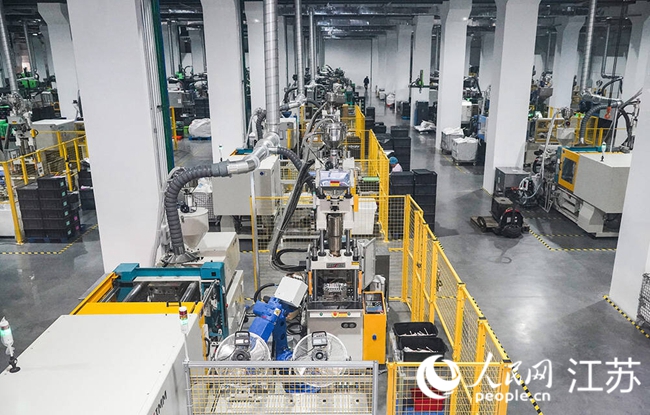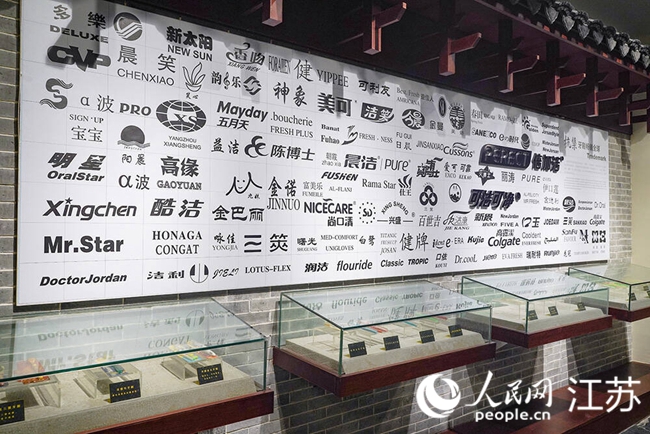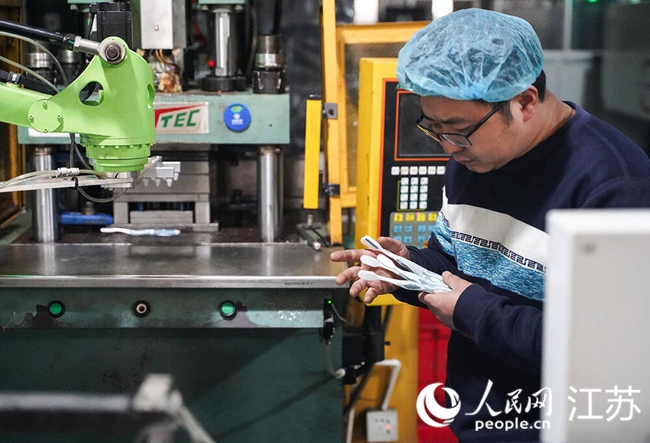Hangji in E China's Jiangsu reaches new heights as 'Toothbrush Capital of China'

Photo shows a green and intelligent factory of Jiangsu Sanxiao Group Co., Ltd. in Hangji, east China's Jiangsu Province. (People's Daily Online/Gao Chao)
Hangji, a township in Yangzhou, east China's Jiangsu Province, produces 7.5 billion toothbrushes annually, dominating the domestic market with a share of over 80 percent and taking more than 35 percent of the global market.
It also holds a significant share of over 65 percent in the domestic market and more than 30 percent in the global market for hotel amenities.
Hangji has earned the titles of "Toothbrush Capital of China" and "Capital of Hotel Amenities of China."

Brands of locally produced toothbrushes are on display at a toothbrush museum in Hangji township, Yangzhou city, east China's Jiangsu Province. (People's Daily Online/Gao Chao)
Despite its small size of 40 square kilometers, Hangji is home to thousands of toothbrush manufacturers. It has a population of 45,000, of whom 25,000 are engaged in secondary industries.
"Through 40 years of hard work and entrepreneurship, Hangji has forged a distinctive path of development known for its widespread entrepreneurship and industry-driven prosperity," said Liu Rui, director of the economic development bureau of Hangji High-tech Industrial Development Zone.
Local toothbrush enterprises in Hangji have experienced a growth trajectory characterized by product development and brand establishment, eventually becoming industry standard setters.
During the reign of Emperor Daoguang (1821-1850) of the Qing Dynasty (1644-1911), a local farmer named Liu Wanxing pioneered toothbrush manufacturing in Hangji by using cow bones for handles and pig bristles for the brush.
In 1976, the first toothbrush factory was established in Hangji. During the 1980s, the township witnessed the emergence of nearly 10,000 toothbrush workshops.
In 1989, Jiangsu Sanxiao Group Co., Ltd, a toothbrush manufacturer, was founded in Hangji.
Sanxiao placed great emphasis on sales networks, ensuring that their new products were available in any county-level market across the country within seven days. By 1998, Sanxiao achieved sales exceeding 1 billion yuan ($139 million).
By leveraging the well-established local industrial chain, several toothbrush enterprises experienced rapid growth in Hangji. This attracted renowned domestic and foreign brands such as Liangmianzhen and Colgate to invest and establish factories in the area.
In 2003, Hangji contributed to the development of the national toothbrush standard. Of the seven companies involved in the drafting process, five were from Hangji.
In 2017, when updating the national standard, Hangji continued to play a significant role, with 12 out of the 21 participating units coming from the township.
According to Liu, standardization plays a crucial role in enhancing independent innovation capability, adjusting industrial structure, and transforming the economic development mode.
Currently, Hangji is home to 4,000 companies involved in the production and supporting industries of toothbrushes and hotel supplies, with an annual sales revenue exceeding 30 billion yuan.

A technician inspects machine injection effectiveness on a semi-automated production line at a toothbrush factory in Hangji township, Yangzhou city, east China's Jiangsu Province. (People's Daily Online/Gao Chao)
Liangmianzhen, a company originally from Liuzhou in south China's Guangxi Zhuang Autonomous Region, is not native to Hangji. However, the company's Hangji factory has the capacity to produce 2 billion small toothpaste tubes every year.
Hangji is the ideal choice for Liangmianzhen's large-scale production due to various factors such as market demand, advanced equipment, and availability of raw materials.
"The Yangtze River Delta, where Hangji is situated, offers a vast market for Liangmianzhen. The company's key customers, such as prominent domestic hotel groups, have their headquarters in Shanghai," explained Lan Jin, general manager of Liangmianzhen (Jiangsu) Industrial Co., Ltd.
Liangmianzhen makes half of its sales in the Yangtze River Delta region.
"Compared to Liuzhou, Yangzhou is closer to equipment manufacturers and raw material suppliers, allowing for convenient access within a radius of 200 to 300 kilometers," Lan added.
In the vicinity of Hangji, there are several enterprises that offer a range of hardware support including brushing machinery, precision molds, robot automation, and integrated application systems for robots.

Two livestream anchors promote products in the E-commerce Industrial Park in Hangji, Yangzhou city, east China's Jiangsu Province. (People's Daily Online/Gao Chao)
"Automated factories transform frontline workers from manual laborers into technical professionals. One person can manage more than 10 machines and coordinate their operations through the operating system," said Han Xiaotian, executive president of Jiangsu Sanxiao Group Co., Ltd.
Liangmianzhen has also made substantial efforts in this field.
"Previously, order processing involved manual splitting, which took up to 48 hours," Lan explained. "Now, by connecting with hotel systems, online orders are swiftly distributed to various departments within the system, allowing goods to be shipped within 72 hours."
Photos
Related Stories
Copyright © 2024 People's Daily Online. All Rights Reserved.









